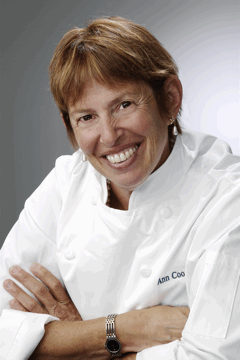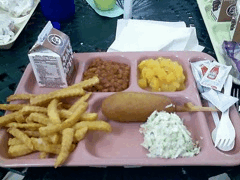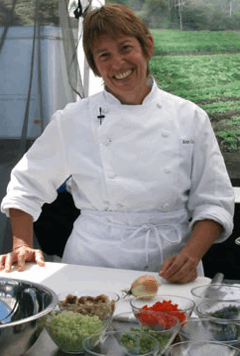Lunch Lady Dishes it Out
Air Date: Week of September 18, 2009

Ann Cooper, the Renegade Lunch Lad
With more than 30 million low-income children dependant on school lunches each day, it’s important for the National School Lunch Program to provide students with nutritious and well-balanced meals. However, Ann Cooper--who calls herself the Renegade Lunch Lady--claims these lunches do just the opposite. Cooper explains to speaks with host Jeff Young and explains why the National School Lunch Program is plagued with problems and how to fix it.
Transcript
YOUNG: More than thirty million kids in this country get free or reduced-price school lunches every day, but the nutritional value of those meals is in question.
[SOUNDS OF BUSY ELEMENTARY SCHOOL LUNCH ROOM]
YOUNG: Living on Earth’s Jessica Ilyse Smith checked out what kids were eating at the Josiah Quincy Elementary School in Boston’s Chinatown.
KID: Chicken nuggets with French fries.
SMITH: Was it good?
KID: Yes.
KID: We’re drinking milk.
[SOUNDS OF SLURPING THROUGH STRAW]
SMITH: And, do you ever get school lunches?
KID: No…
SMITH: What did you eat instead?
KID: Umm, I ate a yogurt. Umm, I ate a peanut butter and jelly sandwich and I have an apple in my lunch box.
SMITH: And what did you eat?
KID: Chicken nuggets with fries.
SMITH: And, what’s your favorite school lunch?
KID: Pizza! And chicken nuggets.
KID: Pizza!
YOUNG: Though the menu’s quite different at the Boulder Valley school district in Colorado. That’s where chef Ann Cooper directs nutrition services. She calls herself the Renegade Lunch Lady and she’s picking a food fight over the nation’s school lunch program. Ann Cooper, we just heard what those kids had for lunch, is that typical?

School lunch
YOUNG: What would you be feeding those kids, instead?
COOPER: So, in Boulder Valley school district where I’m currently the director of nutrition services, instead of chicken nuggets we would serve roast chicken. So a typical day might be roast chicken, roast potatoes, some kind of vegetable, full salad bar, organic regional milk and fresh fruit. We need to serve our kids real food!
YOUNG: Give me a sense of what’s happening in the schools where you have managed to start changing the meals – how do the kids respond?
COOPER: You know, like anything else, not every kid is going to like everything right away. So, you know, some of the kids aren’t going to love it, but then you’ve got to work with the kids. You need to do tastings, farm-to-school programs, hands-on experiential learning in cooking and gardening classes. But it works, kids will eat the food! But you have to work with them, they have to participate, and the food has to be good.
YOUNG: How do we get to where we are, anyway? I mean you listen to parents – parents are always saying you are what you eat! And you listen to politicians – politicians are always saying the kids are our future! So, why is it we’re feeding our future junk?
COOPER: [chuckles] You know, when the national school lunch program started about 60 years ago, it was really all about malnutrition and making sure that our kids ate better food, but about 30 years into the program, about half way through, all the original lunch ladies needed to retire. And, boy that 30-year-old equipment was very tired.
So schools were looking at this big infrastructure need – all this new equipment and all this new hiring. At about that same time we were seeing a lot of highly processed food and a lot of technologies coming out of the war that now had peacetime uses. And all the sudden big businesses such as school districts were kind of scratching their heads, going what do we do next? They said, oh you don’t need lunch ladies that are trained and you don’t need new equipment! Here! We have all this processed food. And because the way the USDA commodifies corn and soy, much of that processed food was really cheap. So, we started down this road of really cheap, processed food in schools.
YOUNG: Give me a sense of the importance of the school lunch program.
COOPER: You know, there’s 1.1 million hungry children every single day in this country, and that for most of those children they get the largest component of their calories from the national school lunch program. The national school lunch program, especially in this economy, is what keeps these children functioning, alive and healthy. And if the food they’re getting isn’t helping to do that, we’re really, really making a mistake.
YOUNG: Well, what’s happening now that gives you reason to hope that you might be able to change things?
COOPER: You know, I’m so optimistic at this point. First of all, we have a president who mentions school lunch and health and children in the same paragraph. The last president who mentioned school lunch was Reagan. He made ketchup a vegetable. So, that gives me great room for optimism. We have a first lady who’s growing a garden for kids on her front lawn – the front lawn of the White House. I mean I’m super optimistic because I think we have an administration and a USDA and Department of Education that really understands the importance of fixing this problem.
YOUNG: Now, Congress, at some point, is going to have to take another look at the very important Child Nutrition Act. The lawmakers have to take a look at it and decide how they’re going to renew it. What opportunities does that present?
COOPER: Well, I would tell you what I believe – that in my perfect world if I could make the decisions I would say we should add a dollar to the reimbursement rate, but have that dollar specifically given a priority to fresh fruits, fresh vegetables, whole grains, and regionally procured foods.
I think we need to allocate money to build new kitchens; we need to allocate money for a training program so that lunch ladies all across the country could get the training to go from processed foods to fresh foods. I think we should start something called the Culinary Corps. Where, you know, we graduate 30,000 culinary students a year from culinary schools and many of them aren’t going to get jobs because the restaurant industry isn’t doing so well. So what if we have tuition reimbursements paid for by the government that would send those culinary students into schools to help cook and teach cooks for schools.
And finally, we need a national marketing campaign. We need to help kids understand that healthy, delicious food can also be food they wanna eat. So we need to make school food cool food.
YOUNG: An extra dollar per meal for that school lunch program – is that what we’re talking about?

Ann Cooper, the Renegade Lunch Lady
YOUNG: So, that’s how you would pitch this, as look I know it’s a lot of money, but this is an investment.
COOPER: It’s absolutely an investment. Research has shown that the life expectancy and achievement gaps between rich and poor kids has grown and grown and grown. We now have a generation of at-risk kids who can’t think at school and can’t do well in school, because they’re hungry and they’re malnourished. That’s just not the America that we all want, that’s not the America we want for kids across this country.
YOUNG: It was Harry Truman who set this program up, right?
COOPER: Correct.
YOUNG: Harry Truman said, “No nation is healthier than its children or more prosperous than its farmers.” What do you think old ‘give em heck’ Harry would say if he saw the state of our kids’ health and our farmers’ prosperity now?
COOPER: I think and I hope he would be disgusted. I think and I hope that he would say, this does need to be a national mandate. That this does need to be a change that we not only can make, but have to make. That we have a moral imperative to take care of our children.
YOUNG: Ann Cooper, the Renegade Lunch Lady. Thanks very much.
COOPER: Thank you.
[MUSIC: Trout Fishing In America “Why I Pack My Lunch” from ‘My Name Is Chicken Joe’ (The Secret Mountain 2009)]
Links
Living on Earth wants to hear from you!
Living on Earth
62 Calef Highway, Suite 212
Lee, NH 03861
Telephone: 617-287-4121
E-mail: comments@loe.org
Newsletter [Click here]
Donate to Living on Earth!
Living on Earth is an independent media program and relies entirely on contributions from listeners and institutions supporting public service. Please donate now to preserve an independent environmental voice.
NewsletterLiving on Earth offers a weekly delivery of the show's rundown to your mailbox. Sign up for our newsletter today!
 Sailors For The Sea: Be the change you want to sea.
Sailors For The Sea: Be the change you want to sea.
 The Grantham Foundation for the Protection of the Environment: Committed to protecting and improving the health of the global environment.
The Grantham Foundation for the Protection of the Environment: Committed to protecting and improving the health of the global environment.
 Contribute to Living on Earth and receive, as our gift to you, an archival print of one of Mark Seth Lender's extraordinary wildlife photographs. Follow the link to see Mark's current collection of photographs.
Contribute to Living on Earth and receive, as our gift to you, an archival print of one of Mark Seth Lender's extraordinary wildlife photographs. Follow the link to see Mark's current collection of photographs.
 Buy a signed copy of Mark Seth Lender's book Smeagull the Seagull & support Living on Earth
Buy a signed copy of Mark Seth Lender's book Smeagull the Seagull & support Living on Earth

